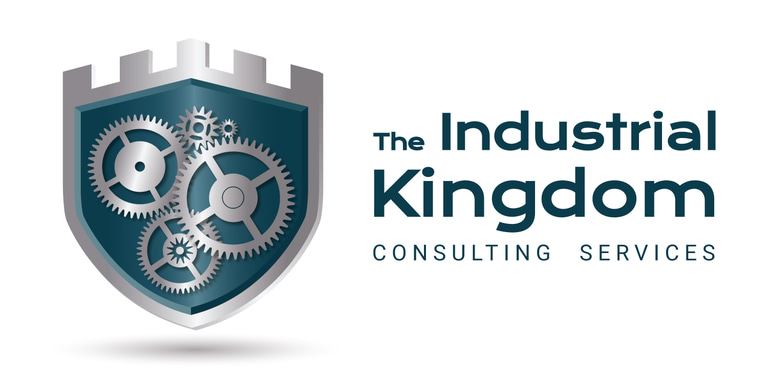Industry Insights from Gulfood 25
The Gulfood tradeshow, hosted annually in Dubai, celebrated its 30th edition this year, firmly establishing itself as the premier global event within the food and beverage industry. This year's focus centered on the significant transition in food systems, showcasing groundbreaking technologies, sustainability breakthroughs, and visionary ideas shaping our food landscape. As Gulfood visitors, we were at the forefront of these shifts, learning, adopting, and synthesizing new trends with timeless traditions.
Valerie Zakka
3/11/20257 min read
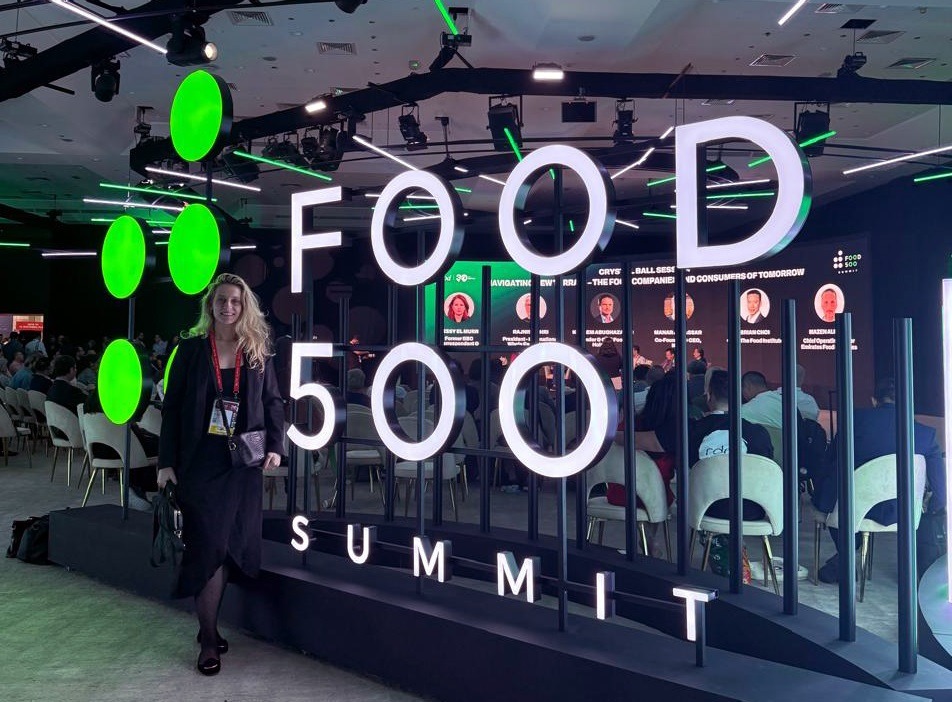

The Future of Food: Key Insights from Gulfood 2025's Food 500 Summit
It is no secret that the GULFOOD show in Dubai has established itself as the premier international tradeshow for the global food sector. This year was the 30Th edition of this industry-shaping event, providing unparalleled opportunities for cross-cultural collaboration, inspiring innovation, and redefining the food industry's dynamics.
This year's focus centered on the significant transition in food systems, showcasing groundbreaking technologies, sustainability breakthroughs, and visionary ideas shaping our food landscape. As Gulfood visitors, we were at the forefront of these shifts, learning, adopting, and synthesizing new trends with timeless traditions.
At The Industrial Kingdom, our participation was strategically aligned with our core activities in agriculture and food processing around the MENAT region, with a particular interest around the themes of food waste management and biomass valorization.
We selected panels from the Food 500 Summit that were centered around our areas of expertise and consultancy services.
AI and Blockchain: The Technology Debate
A round of discussions around Visionaries Exploring Cutting-Edge Technologies Driving Food Tech, dived into the future of food with the advent of new technologies.
As moderator Jessy El Murr highlighted, AI and Blockchain dominated the sessions across multiple panels. A heated debate emerged regarding Web3's potential impact on food businesses, as the industry shifts toward community-focused approaches rather than individual customer targeting.
Blockchain technology remains controversial in the food sector. Several panelists questioned its relevance, suggesting that with appropriate traceability systems already in place, blockchain may be unnecessarily expensive for ensuring food security and quality. The consensus indicated blockchain might be better suited for luxury industries like jewelry, high-end art, pharmaceuticals, and healthcare.
Meanwhile, food businesses from manufacturing to online platforms stand to benefit significantly from early AI adoption, which promises to enhance efficiency, resilience, and market engagement.
Precision Agriculture: Pioneering Smart Agricultural Systems
For widespread adoption, agricultural technology must become affordable and scalable. The future belongs to technology-enabled agribusinesses, particularly in challenging environments like the GCC, where AI and tech innovations are enabling year-round production.
"Data is king!" emerged as a central theme, with technology revolutionizing food tech through data-driven decision-making. Future farming technologies highlighted included:
- Learning loops for data
- Satellite imaging
- Breeding using phenotypes
- AI tools for yield improvement
- AI-powered yield forecasting providing real-time insights
These technologies promise cost savings, yield improvements, and better agricultural decision-making.
In Conversations around Leveraging Digital & Bio Technologies for Food Security and Sustainable Agriculture, Deepak Pareek, Founding Convener of Global Grains and Pulses Council, discussed digital technologies for precision farming, emphasizing AI, IoT, and blockchain's role in optimizing yields, reducing waste, and enhancing climate resilience. He also addressed biotechnologies for sustainable farming practices, including climate-resilient crops and regenerative techniques.
Edward Hamod, Founder and CEO of Switch Foods, highlighted AI's value for consumer insights, product demand forecasting, distribution planning, and streamlining even HR and finance processes.
Supply Chain Resilience and Quality Control
Gautam Aggarwal from Gautam General Trading shared insights on rice farming technology, highlighting AI-powered Sortex machines that make sorting technology more accessible and affordable. He emphasized that choosing the right technology with accurate, timely data is crucial for optimal decision-making, and delivering a better product to fit consumer expectations at lower prices.
To guarantee product assurance, agri-businesses are establishing traceability systems from the source: at collection centers or cooperatives, installing IoT devices on farms. Innovation in sanitary design should be tackled separately from standard agricultural equipment.
Quality control must begin at the farm level. Through technology adoption, farmers and traders can ensure products arrive in optimal condition for the next stages of the value chain. Food manufacturers focused on security will increasingly select suppliers who implement quality control practices at the farm level.
Overcoming Agricultural Challenges
The agricultural sector faces significant roadblocks, particularly regarding technology adoption. The high cost of implementation creates scalability challenges. Currently, the best solution is to seek government funding and donor agency support, as these organizations have developed extensive programs for farmers venturing into tech solutions.
Dr. Afkar Hilles, Food Security Expert at Abu Dhabi Agriculture and Food Safety Authority (ADAFSA), discussed government support services and efforts to ensure food security standards are observed. Policy and Ecosystem building efforts, such as government initiatives, public-private partnerships, and farmer technology training will be invaluable for advancing food security and sustainable agriculture.
Governments must create environments conducive to technology adoption in the agricultural space. The UAE is reportedly developing specialized AI tools for agricultural applications, including a ChatGPT variant specifically for farmers, furthering sustainable agriculture in the GCC.
Sky Kurtz of Pure Harvest Farms emphasized the power of mission-driven consumer brands, noting that farmers who integrate technology into farm and distribution operations face promising opportunities into interacting with their consumers and building a loyal client community.
The future vision involves integrating innovative solutions to achieve a balance between productivity, sustainability, and affordability, with keywords being: affordability, scalability, training, and integration.
Climate Change and Smart Food Systems
Organizations are increasingly working to reduce their production carbon footprint through innovative approaches, investing in technical due diligence to develop commercial products from production waste. This "waste to wealth" movement allows companies to improve sustainability while creating new profit avenues.
A compelling example comes from Olam Food Ingredients, which now converts discarded cocoa fruit into caffeinated beverages as healthy alternatives to energy drinks—an innovative approach to biomass valorization that reduces their GHG.
This circles us back to a project we were part of, being done by Wageningen University & Research, which is set to advance the chocolate industry by experimenting with carob pods fermentation to create a healthier chocolate alternative. This initiative aims to harness the potential of carob pods and pave the way for a new, sustainable alternative to the problematic cocoa farming.
The adoption of sustainable production processes can be quite controversial, what does it mean to have sustainable production ? According to Simon Maas of Agri-food Capital, sustainable production definitions should be collectively determined by all stakeholders of a specific value chain, who must then follow agreed guidelines.
Farmer Adoption and Regenerative Agriculture
Farmer resistance remains a significant challenge to technology adoption. To gain acceptance, sustainable farming must be profitable and inclusive for small farmers. Demonstrating tangible results in yield optimization, waste reduction, and climate resilience is key to reducing resistance.
Regenerative agriculture, though not new, is experiencing a resurgence. This approach prioritizes topsoil health and views agriculture as an interconnected web rather than a linear supply chain. Regenerative farmers reduce reliance on synthetic inputs, creating more resilient ecosystems with fewer toxic chemicals and decreased dependence on costly synthetic inputs.
In the process of prioritizing soil health, many growers naturally use fewer chemical inputs. As beneficial insects and wildlife return and diverse crop and livestock rotations disrupt weed cycles, the ecosystem becomes more resilient. With fewer toxic chemicals, there are reduced human health risks as well as increased financial independence from avoiding the recurring costs of synthetic inputs. The panel also touched on adopting alternative fertilizers for instance, as one way to remain sustainable and highlighted that alternative fertilizers do not necessarily need to be organic.
Food Loss and Waste Management
Anita Neville, Chief Sustainability Officer at Golden Agri-Resources (GAR), emphasized the importance of tackling food loss before food waste, beginning with post-harvest management strategies. With approximately 30% of food production lost, helping farmers maximize their yield value by reducing waste at the point at which it’s created. In other words yes, consumers must do better at tackling food waste, but we must also first look into the issue of food loss at the farm gate.
William Greuel, Deputy Minister of Agriculture for the Government of Saskatchewan agreed, stressing the importance of helping farmers maximize yield production through new knowledge and technologies that are being made available to farmers around the world.
According to the FAO, 40% of food loss occurs at the post-harvest level in developing countries, while in industrialized nations, over 40% of food waste happens at retail and consumer levels. Various composting technologies were discussed as solutions to food loss before it becomes consumer-level waste.
Building the right post-harvest management systems is crucial, as enormous losses still occur at that level. Food technologists must focus on upcycling produce that would otherwise be thrown away.
Alternative Proteins and AI in Food Innovation
The alternative protein space is growing, with the UK, The Netherlands, and Germany leading in terms of market demand. Alternative proteins in ethnic foods represent a growing trend, focusing on taste, texture, and palate expectations. The diversification of protein consumption can contribute to a more global food ecosystem.
Dr. Ali Sedaghat Doost, R&D Scientist from Ghent University in Belgium, discussed AI-based processing for cheese manufacturers as part of protein alternative research efforts. AI will allow to analyze thousands of micro-proteins to predict optimal ingredient combinations more efficiently. Similarly, the on-going work being done at Wageningen University & Research in The Netherlands, uses an Ai platform to experiment with carob pods fermentation to produce a chocolate replacement, to locate and produce the optimal taste and flavour profile.
Hassan Safi, CEO of Al Ain Farms, addressed alternative proteins in the Precision fermentation space.
For the traditionally slow-moving food industry, AI's role in manufacturing and innovation will be groundbreaking. It will enhance R&D, manufacturing speed, energy efficiency, quality control automation, and waste reduction. AI will accelerate food innovation, from ideation to product commercialization.
Furthermore, Ai will help predict demand to produce what is needed, redesigning optimized transportation routes and reducing the environmental impact of the distribution activity while ensuring full traceability, thus further increasing food security.
Future Outlook
The discussions at the Food 500 Summit have highlighted a future laden with opportunities for those willing to integrate innovative solutions and AI into their business models. The emphasis on affordable, scalable technology, and training for farmers ensures that the adoption of new technologies will not only be feasible but also impactful across the whole value chain.
AI is taking a leadership position in driving progress towards sustainable food security. Despite challenges in weather and water resources, the UAE is positioned to lead in food innovation and security through technology implementation.
As we look towards a future where food security and sustainability are paramount, the insights from Gulfood 25 provide a roadmap for businesses ready to embrace these challenges and transform them into opportunities for growth and expansion.
New technologies and approaches are essential, but, instrumental to this progress are talented, skilled professionals who act as the driving force behind creating innovation powerhouses. It is essential to remember, amidst the urgency of adopting Ai and tech in the agro-processing space, that human resources still remain at the heart of an organization’s resilience and success.
Found this interesting ? Share it with your network, send us your comments and questions.
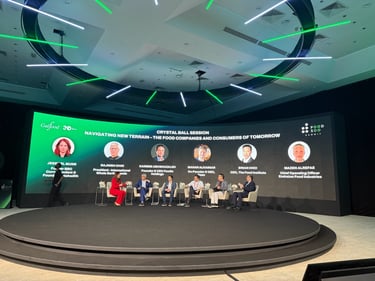
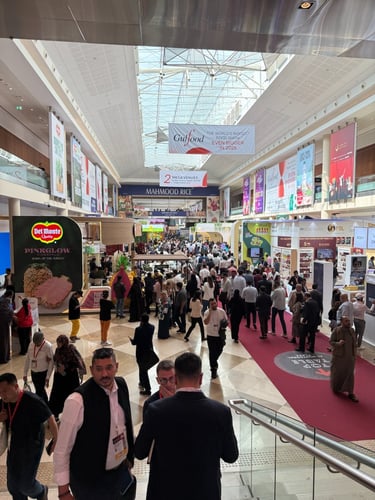
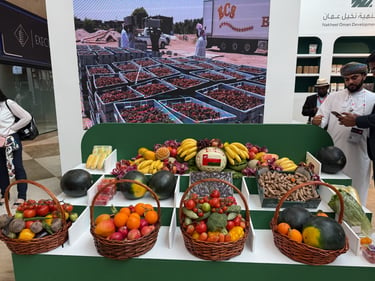



CONTACT


The Industrial Kingdom
Berytech bldg., Mar Roukoz, LEBANON
Mobile: +961.3.621813
hello@theindustrialkingdom.com
ADDRESS
2026, The Industrial Kingdom Consulting Services
Phone: +961.4.533040 ext. 2426
©
valerie.zakka@theindustrialkingdom.com
